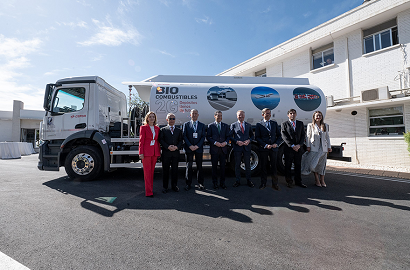Apical teams up with Cepsa at new Huelva biofuels plant

This will be the largest second-generation plant in southern Europe, with an investment of one billion euros
Cepsa has set up a joint venture with Bio-Oils to promote the construction of the largest second-generation (2G) biofuels production plant in southern Europe. The facility, which the energy company announced last March, will be located in the La Rábida Energy Park in Palos de la Frontera (Huelva).
According to their forecasts, the investment foreseen by both companies could reach one billion euros. This is one of the largest private investments in the history of Andalusia, and will generate up to two thousand direct and indirect jobs during the construction and operation phases. Commissioning is scheduled for the first half of 2026.
Feedstock supply
Under the agreement, Huelva-based Bio-Oils will supply Cepsa with most of the raw materials needed to run the plant. These will be sourced from organic waste, such as agricultural waste and used cooking oils. In addition to responding to the challenge of accessing feedstock, Cepsa will therefore be promoting the circular economy by using waste that would otherwise go to landfill.
This initiative marks the entry of the Apical Group - Bio-Oils' Singapore-based parent company - into the sustainable aviation fuels (SAF) segment. The new factory will produce around 500,000 tonnes of this fuel per year, in addition to renewable diesel for other means of transport that are difficult to electrify, such as maritime and heavy-duty road transport.
Digital native plant
Apical and Bio-Oils will also bring their expertise in biofuel production to the alliance. The plant, which will be digitally native, will be equipped with the latest technology developed for this purpose, from artificial intelligence to the internet of things (IoT) and data analytics.
Bio-Oils CEO Óscar García emphasised that Cepsa has already been Bio-Oils' biggest customer for many years, adding, “We share many operational advantages, such as the proximity and interconnection of our facilities, as well as the use of the Reina Sofia dock for loading and unloading our products. This new joint venture is a natural evolution for our relationship”.
A common goal
Expanding the use of SAF and renewable diesel will bring significant benefits to everyone, “both in mitigating the effects of climate change and promoting sustainable economic growth”, according to Apical President Dato' Yeo How, who said, “Apical's extensive supply of high-quality second-generation feedstock is critical for ensuring that the new joint venture meets our shared goal of reducing greenhouse gas emissions from land, sea and air transport”.
Cepsa CEO Maarten Wetselaar explained, “This alliance represents a decisive step in our strategy to lead the biofuels sector in Spain and Portugal, and positions Andalusia as a European benchmark for the production of sustainable energy and the circular economy. Second-generation biofuels are an immediate solution to support our customers' energy transition, as they can be used in conventional engines while at the same time enabling local development and increasing energy autonomy in Europe.
Photo: Cepsa




